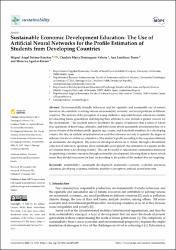/admin/item?itemID=1b5fa203-9c86-4814-8639-1b28d34a235b
Sustainable economic development education : the use of artificial neural networks for the profile estimation of students from developing countries

View/
Type of Access
OpenMaterial Type
ArticleType of Content
Scientific researchLanguage
EnglishCollection
- Investigación ambiental [1743]
Metadata
Show full item record| Abstract: | [English] Environmentally friendly behaviour and the equitable and sustainable use of natural resources can contribute to solving various environmental, economic, and social problems in different countries. The analysis of the perception of young students is important because schools are suitable for educating future generations and shaping their attitudes to also include a greater concern for the environment. This research aims to determine the degree of influence that a series of Likert-type questions of knowledge, attitudes, and behaviours about sustainable development has on a series of items of the student profile (gender, age, course, and household members) in a developing country. |
| Author(s): | Solano-Sánchez, Miguel Ángel
Domínguez-Valerio, Cándida María Lendínez-Turón, Ana Aguilar-Rivero, Minerva |
| Date: | 2022 |
| Published: | Sustainability [2071-1050], 14(3), 1192 |
| Citation: | Solano-Sánchez, M., Domínguez-Valerio, C. M., Lendínez-Turón, A. y Aguilar-Rivero, M. (2022). Sustainable economic development education: the use of artificial neural networks for the profile estimation of students from developing countries. Sustainability, 14(3), 1192. Recuperado de: |
| URI: | https://bvearmb.do/handle/123456789/521
|

